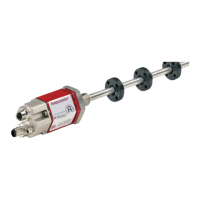Model RH Rod-style position sensor
Model RP Prole-style position sensor
Magnetostrictive, Absolute, Non-contact
Linear-Position Sensors
R-Series Models RP and RH
Synchronous Serial Interface (SSI) Output
Data Sheet
SENS
O
RS
®
Document Part Number
550989 Revision E
All specifications are subject to change. Contact MTS for specifications and
engineering drawings that are critical to your application. Drawings contained
in this document are for reference only. Go to http://www.mtssensors.com for
the latest support documentation and related media.
FEATURES
Linear, Absolute Measurement
LEDs For Sensor Diagnostics
Non-Contact Sensing Technology
Linearity Deviation Less Than 0.01%
Repeatability Within 0.001%
Direct 24/25/26 Bit SSI Output, Gray/Binary Formats
Synchronous Measurement for Accurate Velocity/Acceleration
Calculations
BENEFITS
Superior Accuracy; Resolution Down to 0.5 Micron
Rugged Industrial Sensor
High-Speed Update Options
Linearity Correction Options
Velocity Output Option
Optional Differential Measurement Between Two Magnets
APPLICATIONS
Continuous Operation In Harsh Industrial Conditions
High Pressure Conditions
For Fast, Precision Motion Control
TYPICAL INDUSTRIES
Factory Automation
Fluid Power
Plastic Injection and Blow Molding
Material Handling and Packaging
Woodworking, Metalworking and Machine Tools
Time-based Magnetostrictive position sensing principle
Movable position magnet
Magnetic field from
position magnet
Interaction of magnetic
fields causes waveguide to
generate a strain pulse
Magnetic field encompasses
entire waveguide - generated
by the interrogation pulse
Bias magnet
Strain-Pulse detector
Interrogation
Return wire
Waveguide
Benefits of Magnetostriction
Temposonics linear-position sensors use the time-based
magnetostrictive position sensing principle developed by MTS.
Within the sensing element, a sonic-strain pulse is induced in a
specially designed magnetostrictive waveguide by the momentary
interaction of two magnetic fields. One field comes from a moveable
permanent magnet that passes along the outside of the sensor. The
other field comes from an “interrogation” current pulse applied along
the waveguide. The resulting strain pulse travels at sonic speed along
the waveguide and is detected at the head of the sensing element.
The position of the magnet is determined with high precision and
speed by accurately measuring the elapsed time between the applica-
tion of the interrogation pulse and the arrival of the resulting strain
pulse with a high-speed counter. The elapsed time measurement is
directly proportional to the position of the permanent magnet and is
an absolute value. Therefore, the sensor's output signal corresponds
to absolute position, instead of incremental, and never requires
recalibration or re-homing after a power loss. Absolute, non-contact
sensing eliminates wear, and guarantees the best durability and
output repeatability.

